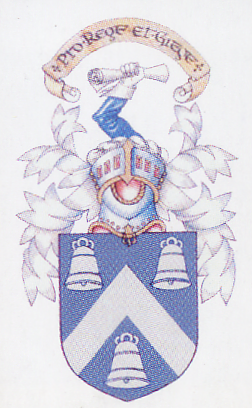Dr. John McDonald
Dr. McDonald arrived in Madras College in 1928 to take
the place of Miss Margaret ("Peggy") Black when she went off to India to
be married. She was a very attractive, popular little teacher and he had
a difficult task to replace a teacher so well liked by everyone.
Almost immediately he was dubbed "Doctor Jock" and
stories began to circulate about him — he had won 1st place in the Open
Bursary Competition to St. Andrews University in his day; he was a First
Class Honours man; he was trying his hand at golf; he had played
football for St. Andrews University.
All pupils were somewhat surprised when, not long after
Dr. McDonald's arrival, a vote was taken in the Assembly Hall from all
the boys in the College on whether soccer or rugby was to be the school
game in winter. The surprise was occasioned by the fact that everyone
knew that the Rector, Mr. J. D. McPetrie, was very keen on rugby, but
had no interest in soccer. Was the new Dr. McDonald at work behind the
scenes ? Many juniors voted for soccer, but the entire senior school
voted for rugby, which carried the day; and no more was heard of soccer
in Madras College.
As a teacher, Doctor Jock intrigued, amused or puzzled
his pupils, according to their mathematical ability, by one outstanding
trait or mannerism — his habit of improving, continually, on the text
book: he always had an alternative way, generally a much shorter way, of
proving any particular proposition. His mind seemed to work far more
quickly than that of others; he was inclined to be a trifle impatient in
attaining his mathematical goal, frequently taking two, three, or even
four steps at once. But he was seldom impatient with his pupils.
He liked to air his French on occasion, but more
frequently he would stray into Classical Greek. He had studied Greek at
St. Andrews under the great Professor John Burnet and was tempted for a
time to take his degree in Classics. In Madras he often had a word to
say to those of his mathematical pupils who were doing Greek; some of
these pupils were given Greek books by him, which were much appreciated.
On the Games Field, in a remarkably short time, he was
refereeing rugby matches, and seemed, in spite of modest disclaimers, to
possess a better knowledge of the rules of the game than others who had
played it. He became in fact quite a rugby enthusiast. But he was keener
on swimming and cricket. People knew that he went into the sea on the
coldest morning of the winter for his swim, and looked on him with awe.
This was a hardiness he might have acquired in the First World War when
he served first in France and Flanders and later changed to the young
Flying Corps as a pilot, taking part in the battles on the Western Front
in the suicidal aircraft of wood and canvas which were the fighters of
those heroic days. He used to say that pilots became soft when they
started using parachutes.
In the Second World War he volunteered for the Royal Air
Force as a pilot, but was thought to be too old. He found himself
teaching maths to prospective airmen, but realising he would be more
useful to his country teaching at Madras, he returned — and took over
command of the local Home Guard.
Doctor Jock became Principal Maths Teacher on the
retiral of Mr. Thomas Carmichael, and in 1955 he became Deputy Rector,
and a later generation knew him as a marvellous manipulator of
timetables, the organiser par excellence, the man who carried in his
head all the detailed organisation of School and could change it at a
moment's notice.
In his work for the school he was completely unsparing
of himself and his time. He was the servant of his pupils, to serve them
with his great ability. He is remembered with affection by his many
pupils and colleagues and it gives them pleasure to meet this weel-kent
figure about the town, at the sports field or in the staff rooms.

